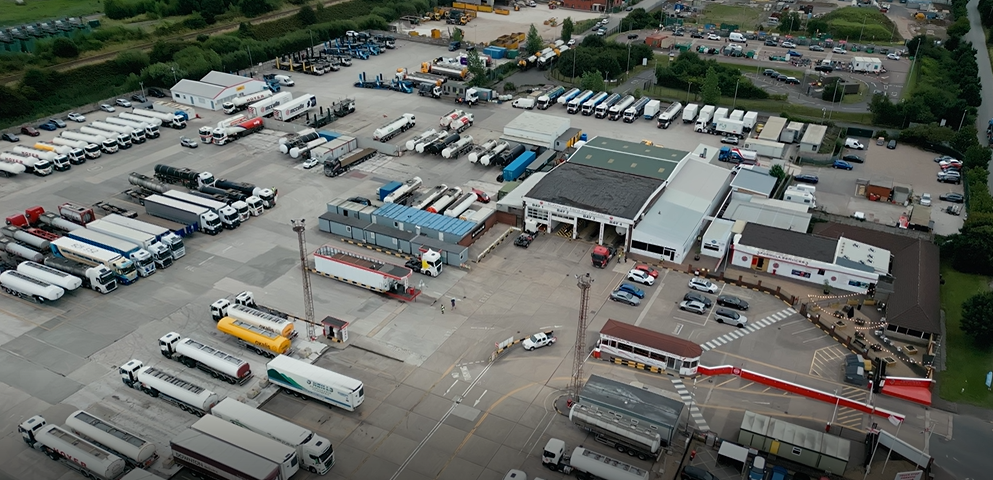
Susie Jones
¿Cómo puede el sector del transporte apoyar la salud mental de los conductores?
Creado: 07/10/2024
•
Actualizado: 10/10/2024
El 44% de los conductores de camiones de larga distancia experimentan síntomas de depresión; sin embargo, a menudo se pasa por alto la salud mental en el sector del transporte. La naturaleza del trabajo desempeña un papel fundamental en el bienestar de los conductores, que se enfrentan a largas horas en la carretera y a largos periodos de aislamiento. El 10 de octubre se celebra el Día de Concienciación sobre la Salud Mental. ¿Cómo pueden los conductores y el sector velar por su bienestar?
¿Cómo pueden los conductores cuidar su salud mental?
Los conductores pueden tomar varias medidas para cuidar su salud mental:
Sueño y descanso
Un sueño adecuado es vital para la salud física y mental. Como conductor de camión, las largas horas al volante pueden alterar un patrón de sueño regular: establecer una rutina mejorará el estado de ánimo, el estado de alerta y el bienestar del conductor.
Hidratación y dieta
Aunque es difícil en la carretera, mantener una dieta equilibrada y mantenerse hidratado es fundamental para evitar los bajones de energía y los cambios de humor.
Gestión del estrés
Parte de la profesión de conductor de vehículos pesados consiste en gestionar las situaciones estresantes. Las técnicas de gestión del estrés, como la gestión del tiempo y los ejercicios de relajación, reducen eficazmente los niveles de estrés. Practicar la atención plena, como la meditación y la respiración profunda, ayuda a mantener la calma.
Ejercicio físico
El ejercicio regular es esencial para la salud física y mental. Ejercicios sencillos como caminar, montar en bicicleta o hacer estiramientos liberan endorfinas y mejoran el estado de ánimo. Descubra cómo mantenerse sano en la carretera.
Hablar
La conducción de camiones es un trabajo aislante en el que los conductores pasan horas sin hablar con nadie. Mantenerse en contacto con amigos, familiares y compañeros mediante llamadas telefónicas y videoconferencias proporciona apoyo y combate el sentimiento de soledad. Las paradas de camiones ofrecen una gran oportunidad para que los conductores hablen con personas afines sobre las tribulaciones del trabajo.
Tómate descansos
Estar al volante durante largos periodos puede ser mentalmente agotador: hacer pausas regulares para descansar y reponer fuerzas reduce los niveles de estrés. Los conductores están sometidos a una normativa estricta en materia de pausas regulares: más información sobre normas y reglamentos sobre tacógrafos.
What drivers said
Hemos pedido a los conductores en las redes sociales que nos cuenten cómo cuidan su salud mental:
Truck Life GB afirma que "apoyo a otros conductores a través de mis plataformas en las redes sociales. Mi bandeja de entrada siempre está abierta para charlar. Ya sea un poco de broma o una charla general, son las pequeñas cosas las que llegan lejos".
"Podcasts y un gran grupo de compañeros que conocen todos los altibajos, como yo con ellos. Al menos uno de ellos tendrá un día peor que el tuyo", explica el camionero Mark.
El servicio de mensajes de texto "Be A Mate" de Mates in Mind permite a los conductores hablar con voluntarios formados 24 horas al día, 7 días a la semana, si se sienten suicidas, ansiosos o agobiados. El servicio es anónimo y no aparece en las facturas telefónicas. Todo lo que tienen que hacer los conductores es marcar "BeAMate" al 85258 para iniciar la conversación.

¿Qué pueden hacer las empresas de flotas?
Los gestores de flotas pueden tomar varias medidas para asegurarse de que sus conductores cuidan de su salud mental. Fomentar un entorno en el que se hable abiertamente y sin prejuicios sobre la salud mental puede cambiar las opiniones y los estigmas.
Las flotas pueden tomar las siguientes medidas:
Carga de trabajo
Siempre que sea posible, reducir la carga de trabajo del conductor puede mejorar significativamente su bienestar.
Apoyo
La comunicación periódica con los conductores fomentará conversaciones sinceras. Proporcionar a los conductores un sistema de apoyo garantizará que no se sientan solos.
Comunicación
Comunicar eficazmente cualquier cambio organizativo reducirá los niveles de estrés entre los conductores.
Cultura
Promover una cultura de trabajo positiva que evite los conflictos y los comportamientos inaceptables.
¿Qué pueden hacer las paradas de camiones para ayudar a la salud mental de los conductores?
Los camioneros dependen de las paradas de camiones para cubrir sus necesidades básicas diarias. Son cruciales para mejorar la salud mental del conductor, ya que actúan como un refugio para los conductores que han pasado largas horas aislados al volante. Ofrecer instalaciones limpias y modernas, opciones de comida sana y un lugar para socializar permite a los conductores relajarse y descansar.
Las paradas de camiones pueden fomentar la comunidad organizando actividades y eventos sociales en los que los conductores puedan conectar con sus compañeros y aliviar los sentimientos de aislamiento.
¿Cómo ha afectado la escasez de conductores a su salud mental?
En 2023, Europa tendrá más de 230.000 vacantes de conductores de camión sin cubrir: una escasez de esta magnitud ha aumentado la presión sobre los que ya trabajan en el sector.
El aumento del comercio electrónico se ha sumado a esta presión: los camioneros deben cumplir plazos de entrega más ajustados y manejar mayores volúmenes de mercancías. El aumento de la carga de trabajo y las presiones añadidas han repercutido significativamente en el bienestar de los conductores, que registran las tasas más altas de rotación de personal.



